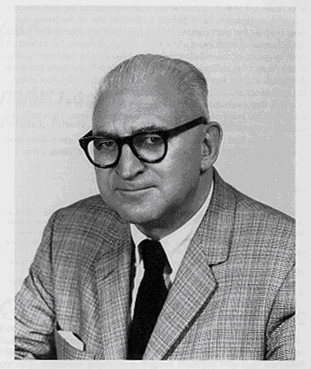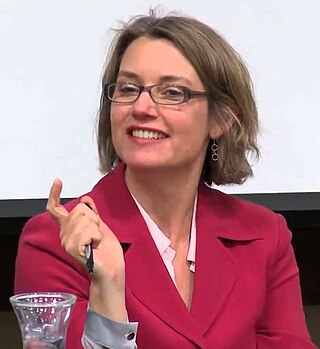Related Research Articles

Harold Dwight Lasswell was an American political scientist and communications theorist. He earned his bachelor's degree in philosophy and economics and his Ph.D. from the University of Chicago. He was a professor of law at Yale University. He served as president of the American Political Science Association, American Society of International Law, and World Academy of Art and Science.

Edward Perkins Channing was an American historian and an author of a monumental History of the United States in six volumes, for which he won the 1926 Pulitzer Prize for History. His thorough research in printed sources and judicious judgments made the book a standard reference for scholars for decades. Channing taught at Harvard 1883–1929 and trained many PhD's who became professors at major universities.
William Anthony Gamson was a professor of Sociology at Boston College, where he was also the co-director of the Media Research and Action Project (MRAP). He is the author of numerous books and articles on political discourse, the mass-media and social movements from as early as the 1960s. His influential works include Power and Discontent (1968), The Strategy of Social Protest (1975), Encounters with Unjust Authority (1982) and Talking Politics (2002), as well as numerous editions of SIMSOC.
Joyce Marcus is a Latin American archaeologist and professor in the Department of Anthropology, College of Literature, Science, and the Arts at the University of Michigan, Ann Arbor. She also holds the position of Curator of Latin American Archaeology, University of Michigan Museum of Anthropological Archaeology. Marcus has published extensively in the field of Latin American archaeological research. Her focus has been primarily on the Zapotec, Maya, and coastal Andean civilizations of Central and South America. Much of her fieldwork has been concentrated in the Valley of Oaxaca, Mexico. She is known for her "Dynamic model", four-tiered hierarchy, and her use of interdisciplinary study.
Arthur Lupia is an American political scientist. He is the Gerald R. Ford University Professor at the University of Michigan and Assistant Director of the National Science Foundation. Prior to joining NSF, he was Chairperson of the Board of the Center for Open Science and Chair of National Research Council's Roundtable on the Application of Behavioral and Social Science. His research concerns how information and institutions affect policy and politics, with a focus on how people make decisions when they lack information. He draws from multiple scientific and philosophical disciplines and uses multiple research methods. His topics of expertise include information processing, persuasion, strategic communication, and civic competence.

W. Russell Neuman is Professor of Media Technology, NYU Steinhardt School of Culture, Education, and Human Development and Professor (Emeritus), Communication Studies, University of Michigan. From 2001 to 2013, Dr. Neuman was the John Derby Evans Professor of Media Technology at the University of Michigan. Neuman received a Ph.D. And M.A. At the University of California, Berkeley Department of Sociology as well as a B.A. from Cornell University's Department of Government. He has an extensive teaching and research career at Yale University, Harvard University, University of Pennsylvania, and the University of Michigan. He is one of the founding faculty members at MIT Media Lab and with Ithiel de Sola Pool, MIT's Research Program on Communication Policy. From 2001-2003 he served as a Senior Policy Analyst in the White House Office of Science and Technology Policy working in the areas of information technology, broadband policy as well as biometrics and international security.
Scott E. Page is an American social scientist and John Seely Brown Distinguished University Professor of Complexity, Social Science, and Management at the University of Michigan, Ann Arbor, where he has been working since 2000. He has also been director of the Center for the Study of Complex Systems at the University of Michigan (2009–2014) and an external faculty member at the Santa Fe Institute.
Yaprak Gürsoy is a Professor of European Politics and the Chair of Contemporary Turkish Studies at the London School of Economics. Prior to joining the LSE she was a Senior Lecturer and the Undergraduate Programme Director of Politics and International Relations at Aston University, Birmingham. She previously worked as an associate professor in the Department of International Relations at the Istanbul Bilgi University and a senior member of the St Antony's College, Oxford University. Professor Gürsoy is also co-founder and co-convenor of T he Turkish Politics Specialist Group of PSA.
Ruth Scodel is an American classicist. She is the D.R. Shackleton-Bailey Collegiate Professor of Greek and Latin at the University of Michigan. Scodel specialises in ancient Greek literature, with particular interests in Homer, Hesiod and Greek Tragedy. Her research has been influenced by narrative theory, cognitive approaches, and politeness theory.
Mark Sheldon Mizruchi is the Robert Cooley Angell Collegiate Professor of Sociology and Barger Family Professor of Organizational Studies at the University of Michigan. He also holds an appointment as Professor of Management and Organizations at the University of Michigan Ross School of Business. His research has focused on the political activity of the U.S. corporate elite over the 20th and 21st centuries. He was influential in the development of social network analysis, and has published research in the fields of organizational theory, economic sociology, and political sociology.
Nicholas A. Valentino is an American political scientist. He currently serves as a principal investigator of the American National Election Studies (ANES).
Dale Baum is an American historian and long time professor at Texas A&M University. He researches the political history of the American Civil War and Reconstruction era, Texas history, and quantitative research of historiography. Baum has authored three books, The Civil War Party System (1984), The Shattering of Texas Unionism (1998), and Counterfeit Justice (2009).
Fatma Müge Göçek is a Turkish sociologist and professor at the University of Michigan. She wrote the book Denial of Violence in 2015 concerning the prosectution of Armenians in the Ottoman Empire and Turkey, for which she received the Mary Douglas award for best book from the American Sociological Association. In 2017, she won a Distinguished Faculty Achievement Award from the university.
Barbara Koremenos is an American Professor of Political Science at the University of Michigan. She is known for her research in the field of international relations, in particular on international organizations and international agreements. Her work on the application of rational choice institutionalism to the design of international organizations is among the most assigned work in international relations graduate training in United States universities.
Arianne Jessica Chernock is an American historian specialized in modern Britain and the history of Europe. She has written two books on women's rights and the history of women in the United Kingdom. Chernock is a professor at Boston University.
Patricia Ann Reuter-Lorenz is an American psychologist who is the Michael I. Posner Collegiate Professor of Psychology and Neuroscience at the University of Michigan. Reuter-Lorenz is Chair of the School of Psychology and researches the cognitive mechanisms of attention. She was elected Fellow of the American Association for the Advancement of Science.
James N. Druckman is an American political scientist who was elected to the American Academy of Arts and Sciences in 2012.

Jenna Bednar is an American political scientist currently serving as Professor of Public Policy at the University of Michigan. In 2019, her book The Robust Federation: Principles of Design received the American Political Science Association's Martha Derthick Book Award.
Amber Ellen Boydstun is an American political scientist and data scientist. She is a professor and director of graduate studies at the University of California, Davis.
Samara Klar is an American political scientist and professor at the University of Arizona. She founded the Women Also Know Stuff database in 2016.
References
- 1 2 3 4 5 6 7 Krupnikov, Yanna (2023). "CV Yanna Krupnikov" (PDF). Yanna Krupnikov. Retrieved 2023-11-18.
- ↑ "Yanna Krupnikov | U-M LSA Communication and Media". lsa.umich.edu. Retrieved 2023-11-19.
- ↑ Reviews of Independent Politics:
- Baylor, Chris (2017). "Review". Political Science Quarterly. 132 (1): 191–192. ISSN 0032-3195. JSTOR 45175823.
- Banks, Antoine J.; Karpowitz, Christopher F.; Skytte, Rasmus; Slothuus, Rune (2017). "Review". The Journal of Politics. 79 (4): e93–e96. ISSN 0022-3816. JSTOR 26551111.
- Thornton, Judd (2016). "Review". The Public Opinion Quarterly. 80 (3): 799–801. ISSN 0033-362X. JSTOR 44014612.
- Ehrhard, Thomas (2016). "Review". Revue française de science politique. 66 (3/4): 630–632. ISSN 0035-2950. JSTOR 24770188.